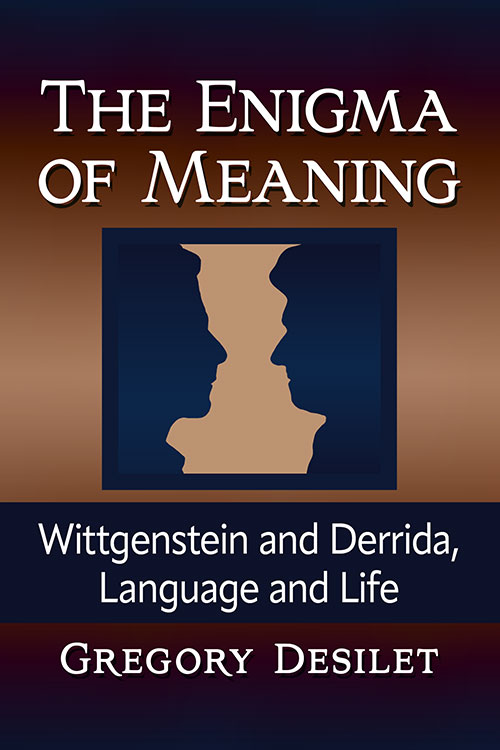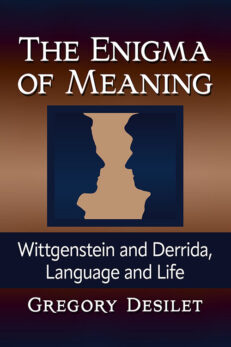The Enigma of Meaning
Wittgenstein and Derrida, Language and Life
$65.00
In stock
About the Book
This work focuses on humanity’s first technology—language—by placing the views of two of the greatest philosophers of the 20th century in direct confrontation on the topic of language/sign communication. It addresses the dominant role of language by the unexpected means of exposing the limits of words and signs for conveying meaning. Identifying these limits leads to the surprising realization that such limits are also precisely what make communication possible.
Wittgenstein strives to shore up the foundation of meaning through a deeper understanding of the tension between rules and practice in the use of signs—while Derrida strives to expose the tension in the nature of the sign itself. This tension underscores the presence of the sign as intimately bound up with its absence. As a result, these two approaches feature contrasting roles for interpretation between a sign and its meaning. Highlighting the differences between these approaches reveals the play of hazards and benefits for language users when faced with alternative ways of understanding and accessing the power and potential of language.
About the Author(s)
Bibliographic Details
Gregory Desilet
Format: softcover (6 x 9)
Pages: 219
Bibliographic Info: appendices, bibliography, index
Copyright Date: 2023
pISBN: 978-1-4766-8982-1
eISBN: 978-1-4766-4961-0
Imprint: McFarland
Table of Contents
Acknowledgments ix
Preface 1
Introduction: The Life of Signs 5
Part I: Derrida in Response to Wittgenstein 13
1. Mind 14
2. Use 28
3. Interpretation 37
4. Rules 45
5. Limits 60
6. Justification 68
Part II: Wittgenstein and Derrida in Contrasting Terms 83
7. Public and Private 84
8. Family Resemblance and Dissemination 92
9. Games and Economies 98
Part III: Wittgenstein and Derrida on Central Philosophical Themes 109
10. Other Minds 110
11. Metaphysics 119
12. Time 132
13. Truth 140
14. Violence 151
Conclusion: The Signs of Life 161
Appendix A: Commentary on Interpretation and “Internal Relation” in Response to Gordon Baker and Peter Hacker (1985); Baker (2004), Hacker (2007) 179
Appendix B: Clarification of Derrida’s View of Oppositional Relation in Response to Ralph E. Shain (2007) 190
Bibliography 195
Index 205
Book Reviews & Awards
- “An instructive comparison between two prominent projects that have not yet been brought together in such a comprehensive and significantly revealing way.”—Paul Livingston, professor of philosophy, University of New Mexico
- “A clear, detailed, and beautifully written study that advances language philosophy research and invites new readers into that body of literature.”—Garnet C. Butchart, associate professor of communication and rhetorical studies, Duquesne University
- “Communication students and scholars will especially value this extended inquiry. It reaches into their central concerns with words, their meanings, and their effects and expands these concerns through its brilliance in addressing the Sign, the Trace, and the ‘is/as’ issue underlying questions of truth. This work will also attract those in philosophy as well as a broad range of additional readers due to its accessible investigations of language as the most vital technology in our daily collective lives. Every reader will benefit from the questions and insights presented in this spirited confrontation between two of last century’s most extraordinary philosophers”—Phillip K. Tompkins, Professor Emeritus Communication and Comparative Literature, University of Colorado, Boulder
- “Demands our attention.”—Phenomenological Reviews





